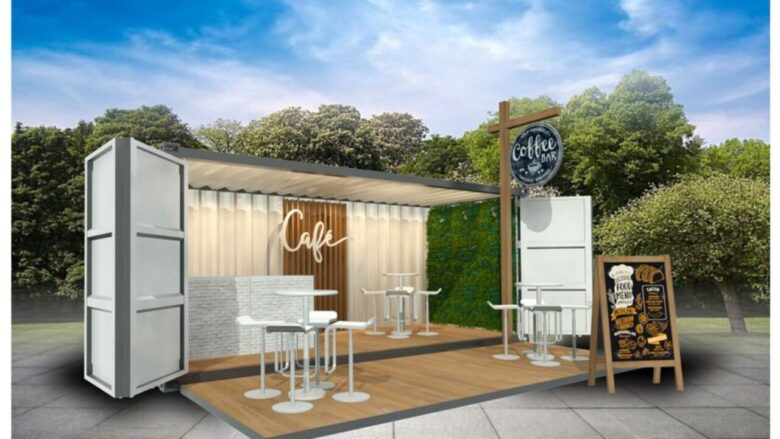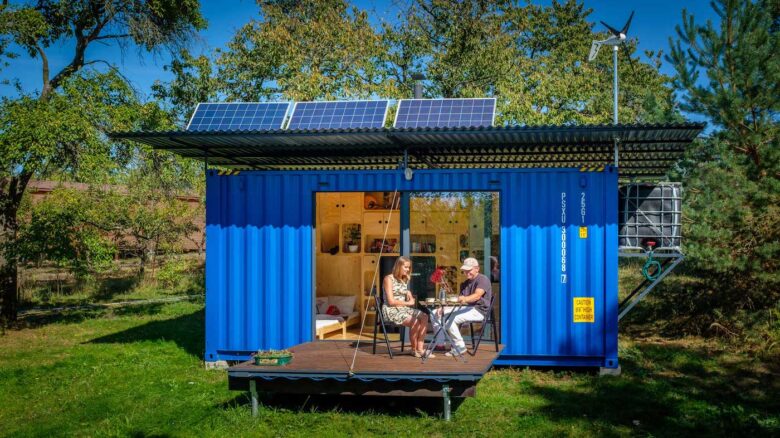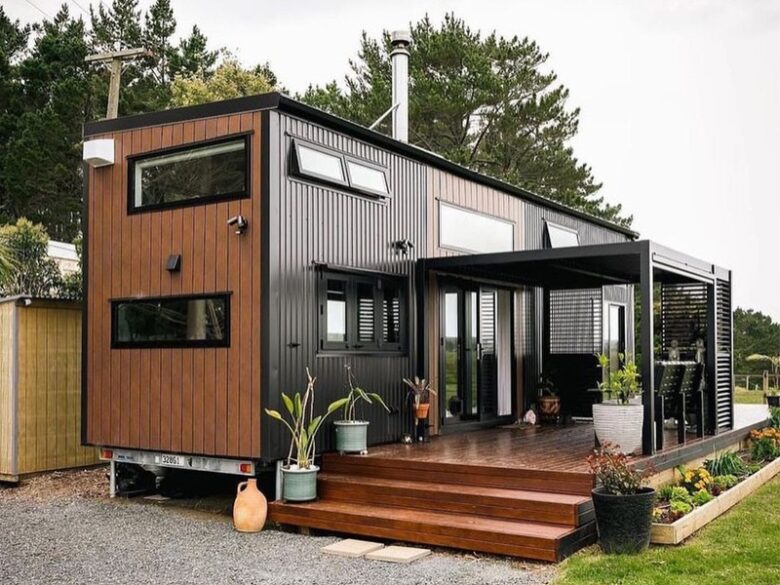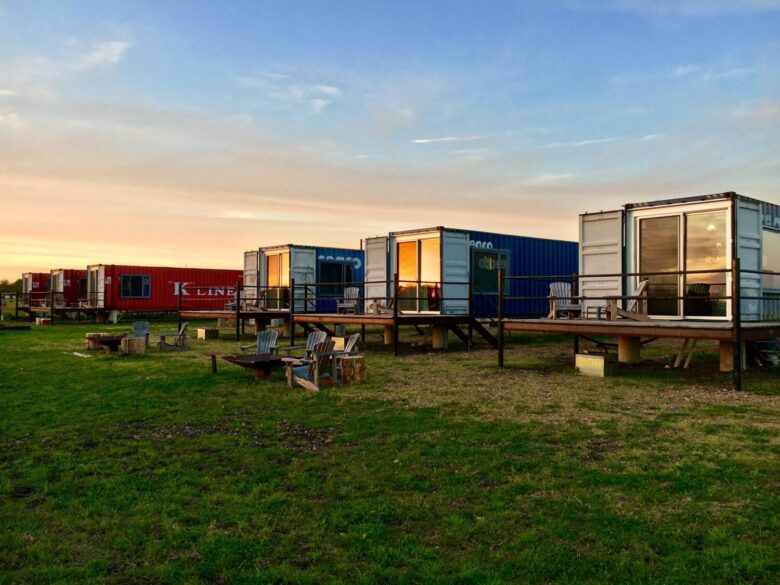In a world where innovation is the driving force behind success, it’s no surprise that entrepreneurs are constantly seeking fresh and imaginative ways to turn ordinary objects into extraordinary opportunities.
Enter the unassuming shipping container, a ubiquitous global trade and commerce symbol. What was once a simple vessel for transporting goods across oceans has become a canvas for innovation and inspiration for enterprising individuals worldwide.
In recent years, the humble shipping container has undergone a remarkable transformation, moving beyond its traditional role in global logistics to become a key player in innovative business ventures. According to NAIOP – the Commercial Real Estate Development Association, “flexibility, affordability, and durability are among the factors behind their growing use.”
Once solely associated with transporting goods across oceans, these sturdy steel boxes are now being repurposed into a wide range of profitable ventures. Let’s explore ways you can transform shipping containers into profitable ventures.
Pop-Up Retail Stores
Shipping containers have become popular for entrepreneurs looking to create eye-catching pop-up retail stores. Their compact size, durability, and portability make them ideal for temporary shops in high-traffic areas like urban centers, festivals, and events.
These containers can be customized to suit any brand’s aesthetic, making them a unique and memorable shopping experience for customers. Compared to traditional brick-and-mortar stores, the cost savings also make them an attractive option for budding retailers looking to test the waters before committing to a permanent location.
Cozy Coffee Shops

Source: archex.ca
Imagine sipping your morning latte in a coffee shop built inside a refurbished shipping container. These micro-cafes have been popping up in cities worldwide, offering a warm and inviting atmosphere while minimizing overhead costs.
You can check out Boxhub.com to explore new and used shipping containers. Once you pick the size and condition of your ideal container, they will help you with the next steps. Once you’ve selected your container, you can move on to the next step and transform it into a cozy coffee shop.
With a well-designed interior and exterior, container coffee shops attract customers with charm and environmental sustainability. These businesses can easily be relocated, allowing owners to explore different neighborhoods and markets.
Art Galleries and Studios
Shipping containers are increasingly being used as mobile art galleries and studios. Their versatility allows artists to showcase their work at various locations, including art fairs, parks, and public spaces.
These containers can be outfitted with climate control systems and lighting to ensure the proper display of artwork.
For artists, this approach reduces the overhead costs associated with maintaining a traditional gallery and creates an interactive and engaging space for art enthusiasts.
Sustainable Housing

One of the most exciting developments in container transformation is the use of shipping containers for sustainable housing. Unfortunately, the global waste problem remains continuous and is expected to triple by 2100.
The good news is that shipping container homes offer several ways to address the global waste problem, contributing to sustainability and environmental conservation.
For example, repurposing abandoned containers and converting them into homes gives them a new purpose and extends their lifespan, reducing the need for additional raw materials for construction. It also reduces construction waste and lowers energy consumption.
Architects and builders have embraced the challenge of converting these containers into modern, eco-friendly homes. Container homes are cost-effective and environmentally friendly, as they repurpose steel containers that would otherwise sit in ports or landfills. These homes can be customized to meet the needs of their occupants and can include all the comforts of a traditional house.
Mobile Food Stalls
Foodies rejoice! Shipping containers have found their way into the world of street food. Container-based food stalls offer a convenient and stylish way for entrepreneurs to start a mobile food business.
Whether you’re selling tacos, gourmet burgers, or artisanal ice cream, these containers can be outfitted with fully equipped kitchens and attractive serving areas. The mobility of these food stalls allows vendors to participate in various events and festivals, ensuring a diverse customer base.
Creative Workspaces

Source: stylesatlife.com
For freelancers, start-ups, and creative professionals, container-based co-working spaces are becoming increasingly popular. These workspaces provide an affordable and unique alternative to traditional office settings. With natural light, custom interiors, and essential amenities, container offices offer a comfortable and inspiring environment for productivity.
Entrepreneurs can rent out individual container workspaces or create larger complexes, fostering community among like-minded individuals.
Event Venues
Shipping containers can be repurposed into event venues, adding an element of uniqueness and style to weddings, parties, and corporate gatherings. According to The New York Times, unconventional wedding venues were in demand in 2022.
These container event spaces can be customized to accommodate different events and themes to meet the growing demand for an unconventional wedding space. Their portability and adaptability allow event planners to create memorable experiences in various locations. Entrepreneurs in the event industry can tap into this growing trend to offer clients a fresh and exciting venue option.
Boutique Hotels and Accommodations

Source: countryliving.com
Container hotels and accommodations are gaining traction in the hospitality industry. These compact and stylish lodgings provide guests with a unique and memorable experience.
Whether you’re spending a night in a treetop container cabin or enjoying a weekend getaway in a container-themed resort, these accommodations offer comfort and sustainability in one package. The modular design of container hotels allows for easy expansion and adaptation to various environments.
Educational and Community Spaces
Shipping containers are also significantly impacting the educational and community sectors. They can be transformed into mobile classrooms, libraries, and community centers. These portable structures enable organizations to bring educational resources and support to underserved areas.
Whether used as a pop-up library in a rural village or a mobile STEM classroom in an urban neighborhood, container-based educational spaces are helping bridge educational gaps.
Greenhouses and Urban Farming
Urban farming has become a sustainable solution to food production in densely populated areas. Shipping containers can be converted into hydroponic or aquaponic systems, allowing for year-round cultivation of fresh produce.
These container farms can be set up in urban environments, reducing the need for long-distance transportation of fruits and vegetables. The controlled environment inside the container ensures optimal growing conditions, making it an efficient and profitable venture for eco-conscious entrepreneurs.
Conclusion
The transformation of shipping containers into profitable ventures is a testament to human ingenuity and creativity. From retail stores and coffee shops to sustainable housing and community centers, these versatile structures are proving to be a game-changer for entrepreneurs and innovators across various industries.
As we explore new ways to repurpose and reimagine shipping containers, the possibilities for profitable ventures are endless.
So, if you’re an aspiring entrepreneur with a unique idea, consider the humble shipping container as your canvas for a successful and sustainable business venture.




